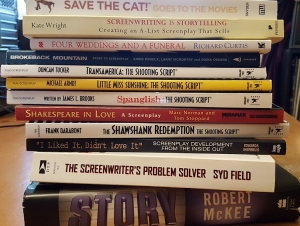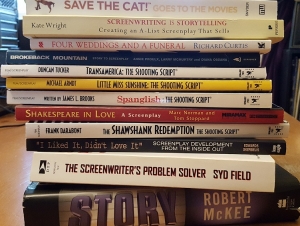Screenwriting Tips That Work for Authors of Books
by Renée J. Lukas
In this series, I’m focusing on screenwriting tips that also work for writing novels.
Tip #2
Give your protagonist obstacles. Then make it worse. Nobody wants to read a story where everyone gets along, the end. Boooring. A story depends on conflict; it can’t exist without it.
 First, give us a character we can root for, then make her suffer. Ironically, in this world of yoga and meditation, everyone telling you to relax. . .your job as the writer is to make your audience as anxious as possible! You heard me. You want to create such anxiety, putting your readers on a roller coaster where they’ll wonder how your character(s) will ever recover.
First, give us a character we can root for, then make her suffer. Ironically, in this world of yoga and meditation, everyone telling you to relax. . .your job as the writer is to make your audience as anxious as possible! You heard me. You want to create such anxiety, putting your readers on a roller coaster where they’ll wonder how your character(s) will ever recover.
In screenwriting class, it’s called raising the stakes. Something bad happens, then the bad thing is further complicated. As a novelist, don’t be too satisfied with the conflict in your premise. Always go for more. For example, not only does Luke Skywalker have to go up against the Dark Side, but dang it, Darth Vader just HAD to be his father, too. Oops. Sorry if that spoiled it for anyone who didn’t know that. If you didn’t know it, you really need to get out more.
Brainstorming Tip for Writers
When you’re blocked about what story you’re going to write, try coming up with a central conflict question to get the ball rolling. It’s a great brainstorming exercise.The main obstacle for your protagonist is also the central question that your story is based on:
- Will Andy Dufresne ever get out of Shawshank prison? (The Shawshank Redemption)
- Can Thelma and Louise evade the cops and make it to Mexico? (Thelma & Louise)
- Will Luke Skywalker defeat Darth Vader? (Star Wars)
- Will Annie ever meet Sam, or will she settle for a loveless marriage with Walter? (Sleepless in Seattle)
- Will Katniss survive the Hunger Games? (The Hunger Games)
- Will Harry ever defeat Voldemort? (Harry Potter) Even though their wands are constantly clashing and it takes forever for someone to die. . .
These are basic story questions, and you’ll inevitably create new questions, especially as more obstacles arise. In my latest novel, Southern Girl, the basic question is: Can two small town girls in an uber-religious community find love with each other, free of danger?
If you can create questions that readers want the answers to, they’ll read on.
The bottom line: In reality, conflict and stress are perceived as negative forces that can ruin your life. In the world of storytelling, conflict and stress are your friends, and they’ll make your story stronger. So embrace them.




